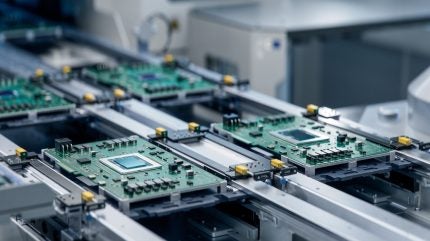
President Donald Trump has issued a renewed warning regarding the imminent imposition of “fairly substantial” tariffs that will come into effect on semiconductor imports from companies that fail to relocate their production to the US.
These remarks were made during a dinner at the White House on 4 September evening, attended by more than two dozen prominent technology executives, including Apple CEO Tim Cook, Meta’s Mark Zuckerberg, and Oracle CEO Safra Catz.

Discover B2B Marketing That Performs
Combine business intelligence and editorial excellence to reach engaged professionals across 36 leading media platforms.
“Yeah, I have discussed it with the people here. Chips and semiconductors – we will be putting tariffs on companies that aren’t coming in. We will be putting a tariff very shortly,” Trump stated, although he did not specify a timeline or the exact tariff rate.
“We will be putting a very substantial tariff, not that high, but fairly substantial tariff with the understanding that if they come into the country, if they are coming in, building, planning to come in, there will not be a tariff,” he added while addressing reporters.
Since his return to office in January 2025, Trump’s tariff threats have created tensions with international trading partners, contributed to fluctuations in financial markets, and heightened global economic uncertainty.
Tariffs have become a key component of Trump’s foreign policy strategy, employed to apply political pressure, renegotiate trade agreements, and secure concessions from nations and companies exporting goods to the US.

US Tariffs are shifting - will you react or anticipate?
Don’t let policy changes catch you off guard. Stay proactive with real-time data and expert analysis.
By GlobalData“If they are not coming in, there is a tariff,” Trump reiterated regarding the semiconductor industry.
He noted that figures such as Apple CEO Tim Cook would likely benefit, as Cook was present during the discussion.
Recently, Apple announced an increase in its domestic investment commitment in the US to $600bn over the next four years.
In August 2025, Trump indicated that the US would impose a tariff of approximately 100% on semiconductor imports, exempting companies that manufacture domestically or have pledged to do so.
Major players in the semiconductor market, including Taiwan’s TSMC and South Korea’s Samsung Electronics and SK Hynix, have revealed plans to invest in chip manufacturing facilities within the US.
Trump has faced several legal challenges, with his administration seeking a prompt review from the US Supreme Court regarding his extensive tariffs, which were enacted under a 1977 law intended for emergencies, following a lower court’s decision that invalidated many of the tariffs central to his economic and trade policies.





